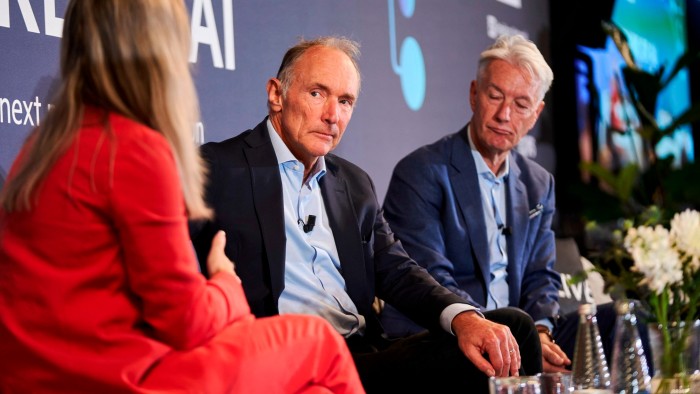Stay informed with free updates
Simply sign up to the Artificial intelligence myFT Digest — delivered directly to your inbox.
The multibillion-dollar advertising model that has underpinned the internet economy could “fall apart” due to the rise of generative artificial intelligence, according to the inventor of the World Wide Web.
Speaking at the FT Future of AI Summit in London on Wednesday, Sir Tim Berners-Lee warned that large language models (LLMs) may eventually replace humans in consuming the internet.
“If web pages are all read by LLMs, then people ask the LLM for the data and the LLM just produces the result, the whole ad-based business model of the web starts to fall apart,” he said.
This system threatens the collapse of the decades-long advertising-based model that has seen the likes of Google and Meta become multitrillion-dollar businesses on the back of powerful ad networks.
Google’s domination of online search is already under threat for the first time in a generation since OpenAI released ChatGPT in late 2022.
Google has responded by launching “AI mode” in its search bar, browser and apps, allowing users to receive conversational answers to questions generated by chatbots instead of a list of blue links — a move that further pushes users away from online advertising.
“A lot of the web relies on advertising,” Berners-Lee added. “Advertising relies on people actually reading web pages . . . if they all assume that a human being is reading the webpage, but the LLM is reading it and the human is not, then we have a problem.”
The father of the World Wide Web, who hopes AI will allow society to press a “reset button” on the internet, acknowledged that some people had been driven “crazy” by aggressive ad targeting amid concerns certain applications had been “listening to their every word”.
He added that “we need to replace [the model] with something else.”
As yet, however, there are few signs of the web-based ad model collapsing. Last week, Google’s parent Alphabet posted a record $100bn in quarterly revenue, with chief executive Sundar Pichai saying its business was being boosted by growing demand at its cloud computing arm.
Meta also reported revenues in the third fiscal quarter of $51.2bn, a 26 per cent increase year on year on a constant currency basis. However, the social media group’s share price was hit by investor concern about plans for huge additional spending on AI infrastructure.
Also speaking at the FT Future of AI Summit, Mark Surman, president of web browser Mozilla, said the ad-based search model was “at a potential crossroads” and urged people to not “let a good crisis go to waste”.
Recommended
Surman suggested it was an opportunity to develop models that were “more privacy respecting” and improve “user agency”.
He added that despite the personalisation of chatbots, people would not exclusively want “that monoculture, that loss of choice” as he cautioned that the current business model “is not going away anytime soon” and has a “long half-life and overtime will rewire in some ways”.
John Bruce, chief executive and co-founder of Inrupt with Berners-Lee — which provides software enabling users to control personal data and third-party access — warned that large brands and payment processors “realise that they are at an existential point of time” as they “potentially become subordinate to an LLM”.
He added that the scale of intrusive, targeted advertising was “about to get to a way worse spot” because of AI.


